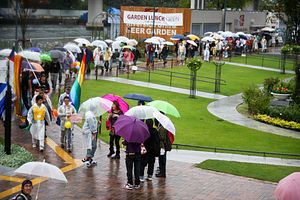Following Shibuya ward’s announcement that it would offer certification to same-sex couples, what might be the beginning of a “domino effect” has occurred in its neighboring ward of Setagaya. Officials there announced late last month that they would also be issuing certificates to officially recognize same-sex couples, starting as early as November. For Setagaya, the certificates will be issued to couples who are aged 20 or older, with at least one of them being a resident of the ward. The certificates that the two wards will be issuing are not legally binding, but they aim to eliminate the discrimination that same-sex couples face, while easing difficulties in areas such as hospital visitation rights or housing applications, which can be denied to couples not legally married.
There are four minor differences between the certifications of Shibuya and Setagaya. The first is that while Shibuya’s is a regulation, or a “rule” that everybody must follow, Setagaya’s is an “outline” – a manual that is required when processing official paperwork. Shibuya’s regulation was decided through votes at the ward’s assembly, while the mayor of Setagaya issued the outline under his authority. The second difference, which follows on from the first, is that any business that does not follow Shibuya’s regulation granting the same rights to same-sex couples will have their names publicly released, while Setagaya makes no such claim.
According to the Tokyo Shinbun, when a member of the ward assembly said that without a detailed plan to which businesses would respond (in other words, some type of penalty), there wouldn’t be any results, the mayor responded that the first step is having the municipality recognize sexual minorities. It thus remains uncertain whether the ward will publicly display the names of businesses.
The third difference is that in order for same-sex couples in Shibuya to apply for the certification, they must first produce a contract stating that they are each other’s guardians, which must be processed at the notary’s office at a relatively hefty cost. In contrast, Setagaya couples need only take an oath. Finally, Shibuya began enforcing the new regulation in April, but certification of the couple’s status will be issued and become available from October. For Setagaya, the written oath as well as the letter of acceptance for it will be issued from November.
With more attention now being given to Japan’s minorities, Article 24 of the Japanese constitution – which states that marriage is “based on the mutual consent of both sexes” – has become a topic for debate. Experts disagree on whether the constitution was meant to define marriage as exclusively heterosexual, since the principle behind it was to reject Japan’s traditional ie system, in which males were given rights over the household, and to officially declare gender equality for both sexes.
Setagaya’s new outline for same-sex couples may be technically less groundbreaking than Shibuya’s new regulation, but it will still have major implications for Japan’s LGBT community. Dentsu, a leading advertising and public relations company in Japan, found in one survey of 70,000 people that 7.6 percent identified as LGBT. Certainly, the decisions by Shibuya and Setagaya to recognize same-sex couples could make a difference in the lives of many. Many more will be hoping that the domino effect is real.













